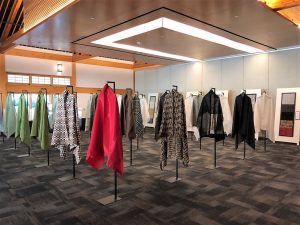Balboa Park exhibits innovative Japanese textiles

By Kendra Sitton
San Diego is the host of the first NUNO exhibit on the west coast in over a decade. The leader in innovative modern Japanese textiles has an exhibit called “The Language of Textiles” at the Japanese Friendship Garden through Feb. 27.
“Hundreds of years of tradition in Japan have influenced today’s art which is also combined with a lot of high tech. Tradition, innovation — the balance between the two is really an interesting topic and something that NUNO textiles really reflect,” said Chad Patton, the managing director of Material Things who curated the exhibit.
NUNO means “cloth” in Japanese and has become a world-famous textile company since being founded 35 years ago by Reiko Sudo with iconic textile creator Jun’ichi Ara. While many museums feature exhibits of the company’s innovative textiles and often sell their products in the gift shop, this is the first exhibit curated specifically Material Things, NUNO’s international distributor which is based in San Diego. The exhibit covers 20 years of Material Things’ textiles they have sold since they were founded.
“It was really fun because it gave us an opportunity to look back at things that [NUNO] produced over the last 20 years that maybe we had forgotten about or hadn’t looked at recently,” Patton said.
The exhibit became an involved process for his small team that typically is busy selling yardage of the textiles to interior designers, fashion designers and Hollywood costume designers. Together, the team selected 30 textiles to display inside the Inamori Pavilion.
Patton approached the Japanese Friendship Garden because although Material Things is based in San Diego, much of their business is in Los Angeles and New York.
“We wanted to do something here locally since we are based here,” Patton said.
The 30 textiles in the exhibit showcase three of NUNO’s unique methods creating textiles.

Initially, the Japanese government approached Sudo to try to revitalize one of the two remaining silk mills in the country. When she toured the factory, Sudo was interested in a pile of waste. It was explained that they were the rough outside of silk cocoons made with short fibers that for hundreds of years were thought to be unusable. Instead of simply designing a new pattern of silk, she worked with women in the town to develop an entire new fabric made with the discarded kibiso fibers. One section of the exhibit shows the stages of turning the short fibers into threads that can be woven.

Another section shows off NUNO’s patented process of origami pleats. The three-dimensional fabric is created by heating up polyester to 400 degrees Fahrenheit. The plasticity in polyester ensures that when heated to that temperature, the pleats become permanent.
The third textile the exhibit focuses on is called feather flurries. While making the double weave silk, the loom is stopped and feathers are manually put into pockets before the loom resumes. The feathers come from game birds eaten at restaurants such as ducks and pheasants, meaning the feathers are essentially recycled into the pockets of the silk fabric.
The exhibit opened on Nov. 12 to much interest from the public. Patton was excited to show modern Japanese art rather than historic pieces. The setting of the traditional garden offsets the changing Japanese aesthetic.

“The modern Japanese aesthetic is something that’s very, very interesting and it’s something that has been influenced by the traditional but today’s Japan is just as beautiful and just as interesting as 500 years ago Japan,” Patton said. “I wanted people to see that.”
Through Feb. 27, people can visit the exhibit and experience modern Japanese design for themselves. General admission at the Japanese Friendship Garden is $12. The garden is open from 10 a.m.-6 p.m. daily at the heart of Balboa Park.
Reach Kendra Sitton at kendra@sdnews.com.
Categories
Recent Posts










GET MORE INFORMATION


